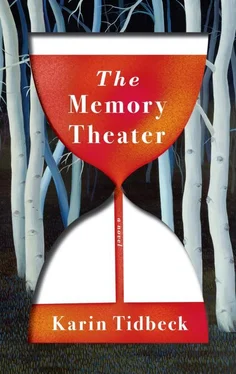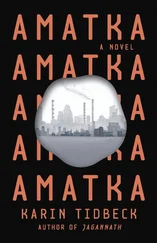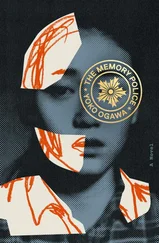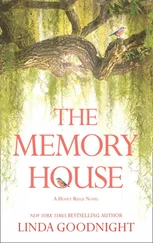“Who is she?”
“She’s a good person,” Dora said. “She’ll help you.”
“Don’t let her hurt me.”
“I won’t,” Dora said.
She held Thistle as Grandmother cleaned his wound.
“It’s deep,” she said. “We’ll need good magic for this.” She pointed to a bucket on the floor. “Go outside and fill this with snow.”
When Dora came back inside, Grandmother had stoked a fire in the stove and was mashing something with a mortar and pestle. She pointed at Dora to set the bucket down next to the stove, and scooped some snow out of it into a copper pot.
“Dora,” Thistle whispered from the kitchen bench.
Dora knelt down next to him. He was shivering. She sat down on the floor next to the sofa and cradled his face in her hands. He had a beard, now, scraggly and redder than his hair. His forehead was very cold. He stared back at her, and his eyes were wild.
“He said you were dead,” Thistle said again. “But it wasn’t him. It was Augusta.”
Dora shook her head. “I don’t understand.”
“He was Augusta in disguise,” Thistle said. “It was her. And she kept me here. Told me you were dead. I grieved. I gave up.”
“But I’m not,” Dora said. “I’m not. I was a stone.”
Thistle frowned. “What?”
Dora shrugged. “I was a stone. Where is she?”
“Gone,” Thistle said. “Gone.”
He closed his eyes and seemed to fall asleep.
“Thistle,” Dora said, and shook his shoulder.
“That’s not my name,” he mumbled.
—
Grandmother came over to the kitchen bench, mortar in her hands. She knelt down next to the sofa.
“This will hurt, my dear,” she told Thistle. “Dora, hold his hands.”
Dora held on as Grandmother scooped sharp-smelling goop out of the mortar and packed it into Thistle’s wound. Thistle didn’t scream but went stiff and started to shiver violently. Grandmother covered the poultice with a strip of cotton and bound it tight around his waist. Then she laid a hand on the poultice and started to sing. It was a low, muted song that wound in circles and spirals, in that dialect that Dora didn’t understand. Thistle’s arms gradually relaxed.
“There,” Grandmother said. “That’ll draw the bad fluids out and heal the wound.”
Thistle’s face had gone from sickly to slightly rosy, and he seemed to breathe easier. Grandmother nodded to herself.
“He’ll be all right in a while,” she said.
The front door opened, and there was a stomping and scraping noise as Grandfather kicked snow from his boots. He came into the kitchen and exchanged glances with Grandmother.
“The cows were alone in there for a while,” he said. “I had to milk them. There’s a horse, too. I don’t know whose it is.”
“Nils is gone,” Grandmother said. “It seems he hurt this boy badly.”
“He said it wasn’t Nils,” Dora said. “He said it was Augusta.”
Grandfather frowned.
“Not now,” Grandmother said. “We’ll need to take this boy home.”
Thistle wasn’t light anymore; he had put on muscle. But Dora carried him all the way back to the mine, through the night lit by Grandmother and Grandfather’s lanterns. They brought the horse and the cows, too; the animals followed without protest. Then Dora bedded Thistle down by the fireplace and let him sleep. She sat on the floor next to him, watching. She shook her head when Grandfather asked if she wasn’t going to rest. She had had enough sleep. While Grandfather and Grandmother went to bed, Dora sank back, letting her breathing slow down, concentrating on Thistle’s right hand in hers. It had calluses now, and dirt under the fingernails. He would need a bath. He had always been so mindful about bathing.
Grandmother and Grandfather got up again after what seemed like no time at all, and Grandmother checked on Thistle’s wound and said it looked all right. Then she asked Dora to help her with breakfast while Grandfather went to take care of the cows. They moved Thistle into the armchair by the fire. Dora sat down next to him and spooned buttered porridge into his mouth, because his hands were shaking so much he couldn’t feed himself. He was still clammy and sickly-looking, but his eyes had lost the crazed gleam of the day before. He didn’t speak until the bowl was empty.
“I was supposed to take care of you,” he said, and his voice was creaky. “Not the other way around.”
“Not in the outside world,” Dora said. “You taught me how to live in the Gardens. Now I’ll protect you here.”
“I mourned you. I missed you so much,” he said, and his voice broke.
Dora took his hand. “I’m here now,” she said.
Thistle held out his arm, and she lifted him into her lap. He rested his head on her shoulder, breathing in deep sighs. Dora smoothed down his hair and kissed the top of his head.
“It was Augusta,” Thistle said into her shoulder. “It was her the whole time. She made me teach her the song to the crossroads. But I got my name back.”
“What’s your name?” Dora asked.
“Albin,” he mumbled. “It’s Albin.”
“It’s a good name,” Dora said.
“I remember everything now,” he said. “When she gave me my name… it all came back. My parents, who they are. My village. Where it is. I know the way now.”
He raised his head, casting a glance around the room. Grandmother stood in the doorway. She gave Albin a gentle smile.
“I could tell you to trust us, but that wouldn’t reassure you,” she said.
“I’ll watch over you,” Dora told Albin. “Until you’re healed.”
Albin looked at Grandmother, then Dora.
“Only until I’m better,” he said.
Dora nodded. “Only until you’re better.”
—
They stayed with Grandmother and Grandfather while the days shortened and snow piled up around the mine’s entrance. Dora helped Grandmother and Grandfather with the last preparations for a long winter; Grandfather taught her to ski and snare grouse. One day Albin stepped out of the mine, and soon enough he too had his first go at skiing. He talked more and smiled again. Sometimes he would talk about his parents, but hesitantly, as if the memories would break when he spoke them out loud: My father taught me how to whittle wood. My mother has eyes like that. We had an apple tree and a dog.
He would let only Dora come near him. If their hosts took offense, they didn’t show it.
One evening, Albin sat down beside Dora where she was peeling potatoes next to Grandmother.
“I’m ready,” he said. “I want to go home.”
Dora looked at him. Albin reached out and rubbed his thumb over Dora’s cheek.
“You still manage to get dirt everywhere,” he said with a grin.
Dora smiled back at him.
Albin’s smile softened a little. “You’ve changed, though.”
“How?”
“I can’t put my finger on it.” He leaned back. “You seem happier. Like you belong here.”
“Do you know where you’re going, then?” Grandmother asked.
“We’re following my name,” Albin said. “I can feel it calling me. Home. Where I came from. I know the way now. It’s south.”
Grandmother and Grandfather wouldn’t let them leave without a birch-bark satchel each, stuffed with food and with a woolen blanket on top.
“Off you go, then,” Grandfather said, and his voice was thick.
“Good luck,” Grandmother added.
Grandfather gave Dora a tight hug, then held his arms out to Albin, who blinked and offered his hand instead. Grandmother put her arms around Dora. She seemed smaller somehow.
“Goodbye, daughter of the earth,” she said as she drew away. “You remind me of my own.”
Читать дальше










![Карин Тидбек - Аматка [ЛП]](/books/438406/karin-tidbek-amatka-lp-thumb.webp)

